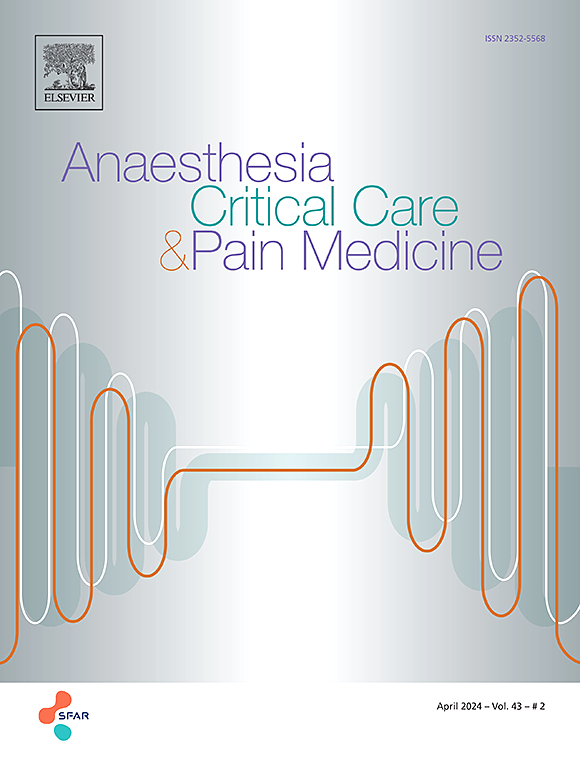Self-Reported Penicillin Allergy and antibiotic use in critical care: An observational, retrospective study
IF 3.7
3区 医学
Q1 ANESTHESIOLOGY
引用次数: 0
Abstract
Background
Patients with Self-Reported Penicillin Allergy (SRPA) receive alternative antibiotics, which increase the length of stay and hospital costs, but the impact of SRPA on mortality in critically ill patients is not well described.
Methods
This was a single-center, retrospective analysis of routinely gathered clinical data for all intensive care unit (ICU) admissions over nine years. The primary outcome was 28-day mortality, which was analyzed using a time-to-event approach with multivariable models to adjust for confounding factors, including age, comorbidities, sex, and admission SOFA score (as a measure of organ dysfunction). Antibiotic prescriptions during the ICU stay were also interrogated and compared.
Results
Of 35,319 admissions, 11.7% had SRPA. Compared with non-SRPA, patients with SRPA were more likely to be female (52.2% vs. 37.4%, p < 0.001) and had more comorbidities (p < 0.001) but had similar admission SOFA scores (median: 3.5 in both groups, p = 0.839). Patients with SRPA had significantly lower 28-day mortality (9.6% vs. 10.9%, p = 0.011). After multivariable adjustment for baseline characteristics, this effect persisted for unplanned (hazard ratio [HR]: 0.76, 95% CI: 0.68−0.86, p < 0.001), but not planned admissions (HR: 1.21, 95% CI: 0.92−1.58, p = 0.172). Whilst the duration of antibiotics in ICU was similar in the SRPA and non-SRPA groups (mean: 3.4 vs. 3.4 days, p = 0.663), the antibiotics used differed, with SRPA patients being significantly more likely to receive quinolones or other anti-Gram-positive antibiotics (p < 0.001).
Conclusion
SRPA was associated with a survival benefit that persisted after adjustment for confounders for unplanned ICU admissions. Patients with SRPA were more likely to receive antibiotics that are not active against anaerobic bacteria.
危重病患者自我报告青霉素过敏和抗生素使用:一项观察性、回顾性研究。
背景:自我报告青霉素过敏(SRPA)的患者接受替代抗生素治疗,这会增加住院时间和住院费用,但SRPA对危重患者死亡率的影响尚未得到很好的描述。方法:这是一个单中心,回顾性分析常规收集的所有重症监护病房(ICU)住院9年以上的临床数据。主要结局是28天死亡率,使用多变量模型的时间到事件方法进行分析,以调整混杂因素,包括年龄、合并症、性别和入院SOFA评分(作为器官功能障碍的衡量标准)。对ICU住院期间的抗生素处方进行询问和比较。结果:在35319例入院患者中,有11.7%患有SRPA。与非SRPA患者相比,SRPA患者更有可能是女性(52.2% vs. 37.4%)。结论:SRPA与生存获益相关,该获益在调整计划外ICU入院的混杂因素后持续存在。SRPA患者更有可能接受对厌氧菌无效的抗生素。重症监护,青霉素过敏,抗菌素过敏,死亡率,抗菌素管理,急性护理。
本文章由计算机程序翻译,如有差异,请以英文原文为准。
求助全文
约1分钟内获得全文
求助全文
来源期刊

Anaesthesia Critical Care & Pain Medicine
ANESTHESIOLOGY-
CiteScore
6.70
自引率
5.50%
发文量
150
审稿时长
18 days
期刊介绍:
Anaesthesia, Critical Care & Pain Medicine (formerly Annales Françaises d''Anesthésie et de Réanimation) publishes in English the highest quality original material, both scientific and clinical, on all aspects of anaesthesia, critical care & pain medicine.
 求助内容:
求助内容: 应助结果提醒方式:
应助结果提醒方式:


